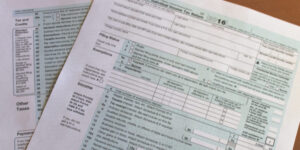April 2018 Newsletter – Tax Records

Don’t Throw Away These Tax Records
This article was originally published in the Kiplinger By Kimberly Lankford, Contributing Editor
April 4, 2017
After you file this year’s tax return, these are the old documents you should keep and the ones you can toss.
The IRS generally has up to three years after the tax-filing deadline to initiate an audit. So keep your tax returns and supporting documents at least that long. In other words, after April 15 this year, hang on to returns and documents for tax years 2012 through 2014 . Keep copies of your W-2 forms; 1099 forms reporting interest, dividends, capital-gains distributions and other income. Keep canceled checks and receipts for charitable donations; records showing eligible expenses for other deductions and credits. Also keep eligible expenses for health savings account and 529 withdrawals and information you needed to document income or deductions. For more information about the documents you need to keep, see IRS Tax Topic 305 Record Keeping.
Record Keeping
 Keep tax records showing that you had minimum essential health insurance coverage or qualified for an exemption. As well as records of any premium subsidy you received. See How Obamacare Affects Your 2014 Tax Return for more about the documents you now must keep.
Keep tax records showing that you had minimum essential health insurance coverage or qualified for an exemption. As well as records of any premium subsidy you received. See How Obamacare Affects Your 2014 Tax Return for more about the documents you now must keep.
It doesn’t hurt to keep the actual returns forever in case you need them. When you apply for a mortgage or disability insurance or need to track down the value of certain assets. (You can scan them and keep a digital archive; see 7 Steps to Convert Paper Files to Digital for more information). If you’re self-employed or have a small business keep your records longer. Also if you have income from a variety of sources or a complex tax situation. The IRS has up to six years to audit anyone who neglects to report more than 25% of his or her income.
Beyond 3 or 6 years
And there are other documents you should keep beyond the three or six years:
Keep Form 8606 reporting nondeductible contributions to traditional IRAs until you withdraw all of the money from the IRAs. So you can prove that you’ve already paid taxes on the contributions and won’t be taxed on them again.
Keep tax records showing the purchase date and price of stocks and mutual funds in taxable accounts. You’ll have to report the purchase date and price when you sell the investment so you can establish the basis and determine the taxable gain or loss. Brokers must report the cost basis of stocks purchased in 2011 or later and mutual funds and ETFs purchased in 2012 and or later, but even for investments you made after then, it helps to keep your own records in case you switch brokers. If you inherit stocks or funds, keep records of the value on the day the original owner died to help calculate your basis when you finally sell them.
Keep records of reinvested dividends that you’ve already paid taxes on so you won’t be taxed on them again when you sell the security.
Keep records of home improvements as long as you own the house. You generally aren’t taxed on home-sale profits if you lived in the home for at least two of the past five years and your profit is less than $250,000 if you’re single or $500,000 if married filing jointly. But if you don’t live in the home that long or you have a bigger profit, you may have to pay taxes on some of your profits. You can add the cost of major home improvements (not repairs) to the basis to reduce your taxable gain.
